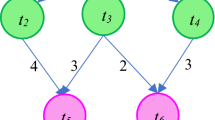Abstract
Applications involving multifarious computational requirements take the advantage of the versatility of heterogeneous computing systems (HCS) with more than one type of parallelism. Efficient scheduling of workflow applications is paramount to harness high performance from HCS. In the present work, a new list-based heuristic strategy namely maximizing parallelism for minimizing earliest finish time (MPEFT) algorithm is proposed with a primary objective of minimizing the makespan. In order to minimize the makespan, the proposed scheduling policy focuses on proliferating the parallelism of the workflows by choosing the globally heaviest task with more number of successors such that more number of successors can be released. Thus, the priority policy maximizes the length of the ready queue by exploring higher degree of parallelism of the workflow. The proposed approach is designed to adapt depth-wise whenever the tasks at subsequent levels are released and continues to be level-wise otherwise. This increases the degree of parallelism and shortens the makespan. To evaluate the proposed scheduling algorithm, experimentations are conducted using randomly generated workflows and scientific workflows namely LIGO, Epigenomics, Cybershake, and Montage. The experimental results show that the proposed MPEFT algorithm surpassed the classical list based heuristic algorithms in terms of metrics viz., makespan, speedup, efficiency and frequency of best results.








Similar content being viewed by others
References
Abramovici, M., Althouse, W.E., Drever, R.W., Gursel, Y., Kawamura, S., Raab, F.J., Shoemaker, D., Sievers, L., Spero, R.E., Thorne, K.S.: LIGO the laser interferometer gravitational-wave observatory. Science 256(5055), 325–333 (1992)
Ahmad, W., Alam, B.: An efficient list scheduling algorithm with task duplication for scientific big data workflow in heterogeneous computing environments. Concurr. Comput. Pract. Exp. (2020). https://doi.org/10.1002/cpe.5987
AlEbrahim, S., Ahmad, I.: Task scheduling for heterogeneous computing systems. J. Supercomput. 73, 2313–2338 (2017). https://doi.org/10.1007/s11227-016-1917-2
Arabnejad, H., Barbosa, J.M.: List scheduling algorithm for heterogeneous systems by an optimistic cost table. IEEE Trans. Parallel Distrib. Syst. 25(3), 682–694 (2014)
Berriman, G., Laity, A., Good, J., Jacob, J., Katz, D., Deelman, E., Singh, G., Su, M., Prince, T.: Montage: the architecture and scientific applications of a national virtual observatory service for computing astronomical image mosaics. In:Proceedings of Earth Sciences Technology Conference (2006).
Daoud, M.I., Kharma, N.: A high performance algorithm for static task scheduling in heterogeneous distributed computing systems. J. Parallel Distrib. Comput. 68, 399–409 (2008)
Djigal, H., Feng, J., Lu, J., Ge, J.: IPPTS: an efficient algorithm for scientific workflow scheduling in heterogeneous computing systems. IEEE Trans. Parallel Distrib. Syst. 32(05), 1057–1071 (2021). https://doi.org/10.1109/TPDS.2020.3041829
Djigal, H., Feng, J., Lu, J.: Task scheduling for heterogeneous computing using a predict cost matrix. In: Proceedings of the 48th International Conference on Parallel Processing Workshop, August 2019 (2019)
Gary, M.R., Johnson, D.S.: Computers and intractability: a guide to the theory of NP-completeness. W.H. Freeman and Co., San Francisco (1979)
Graves, R., Jordan, T.H., Callaghan, S., Deelman, E., Field, E., Juve, G., Kesselman, C., Maechling, P., Mehta, G., Milner, K.: Cybershake: a physics-based seismic hazard model for Southern California. Pure Appl. Geophys. 168(3–4), 367–381 (2011)
Ijaz, S., Munir, E.U., Ahmad, S.G., et al.: Energy-makespan optimization of workflow scheduling in fog–cloud computing. Computing 103, 2033–2059 (2021). https://doi.org/10.1007/s00607-021-00930-0
Illavarasan, E., Thambidurai, P.: Low complexity performance effective task scheduling algorithm for heterogeneous computing environments. J. Comput. Sci. 3(2), 94–103 (2007)
Juve, G., Chervenak, A., Deelman, E., Bharathi, S., Mehta, G., Vahi, K.: Characterizing and profiling scientific workflows. Future Gener. Comput. Syst. 29(3), 682–692 (2013)
Kruatrachue, B., Lewis, T.: Grain size determination for parallel processing. IEEE Softw. 5(1), 23–32 (1998)
Kwok, Y., Ahmad, I.: Static scheduling algorithms for allocating directed task graphs to multiprocessors. ACM Comput. Surv. 31(4), 406–471 (1999)
Maurya, A.K., Tripathi, A.K.: On benchmarking task scheduling algorithms for heterogeneous computing systems. J. Supercomput. 74(7), 3039–3070 (2018)
Senapati, D., Sarkar, A., Karfa, C.: HMDS: a makespan minimizing DAG scheduler for heterogeneous distributed systems. ACM Trans. Embed. Comput. Syst. 20(5), 1–26 (2021). https://doi.org/10.1145/3477037. (article no. 106)
Sirisha, D., Vijayakumari, G.: A new heuristic for minimizing schedule length in heterogeneous computing systems. Proc. IEEE ICECCT 2, 821–827 (2015)
Sirisha, D., Vijayakumari, G.: Towards efficient completion time bounds and resource provisioning for scheduling workflows on heterogeneous computing environments. Int. J. Grid High Perform. Computi. 9(3), 60–82 (2017)
Topcuoglu, H., Hariri, S., Wu, M.Y.: Performance effective and low complexity task scheduling for heterogeneous computing. IEEE Trans. Parallel Distrib. Syst. 13(3), 260–274 (2002)
USC Epigenome Center (2019). http://epigenome.usc.edu
Wu, Q., Ishikawa, F., Zhu, Q., Xia, Y., Wen, J.: Deadline-constrained cost optimization approaches for workflow scheduling in clouds. IEEE Trans. Parallel Distrib. Syst. 28(12), 3401–3412 (2017). https://doi.org/10.1109/TPDS.2017.2735400
Xu, Y., Li, K., He, L., Truong, T.K.: A DAG scheduling scheme on heterogeneous computing systems using double molecular structure-based chemical reaction optimization. J. Parallel Distrib. Comput. 73, 1306–1322 (2013)
Author information
Authors and Affiliations
Corresponding author
Ethics declarations
Conflict of interest
The authors declare that they have no conflicts of interest.
Rights and permissions
Springer Nature or its licensor holds exclusive rights to this article under a publishing agreement with the author(s) or other rightsholder(s); author self-archiving of the accepted manuscript version of this article is solely governed by the terms of such publishing agreement and applicable law.
About this article
Cite this article
Sirisha, D., Prasad, S.S. MPEFT: a makespan minimizing heuristic scheduling algorithm for workflows in heterogeneous computing systems. CCF Trans. HPC 5, 374–389 (2023). https://doi.org/10.1007/s42514-022-00116-w
Received:
Accepted:
Published:
Issue Date:
DOI: https://doi.org/10.1007/s42514-022-00116-w




